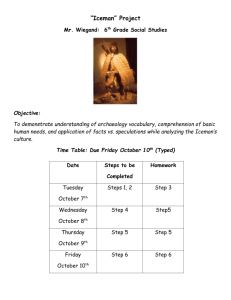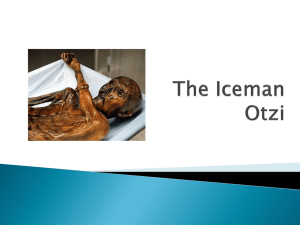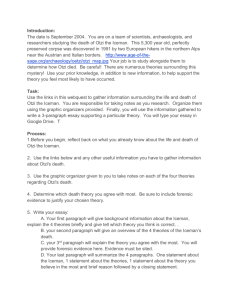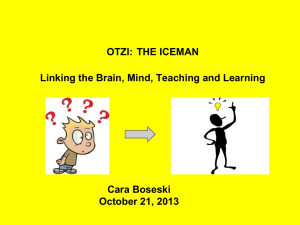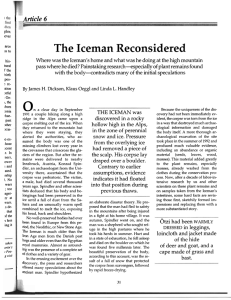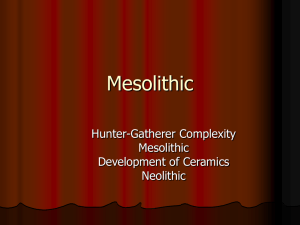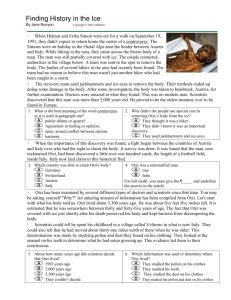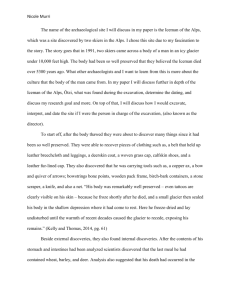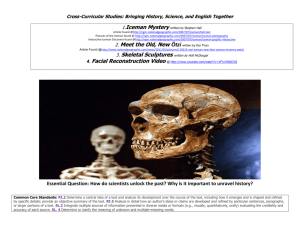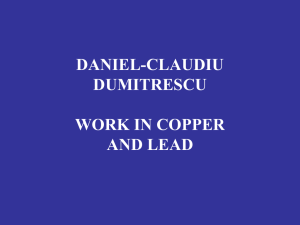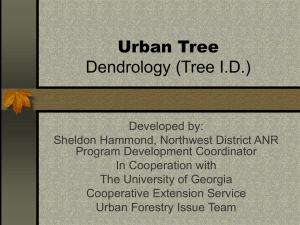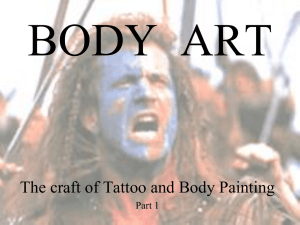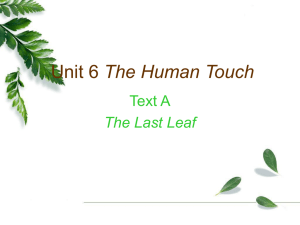Otzi PP otzi_the_iceman
advertisement
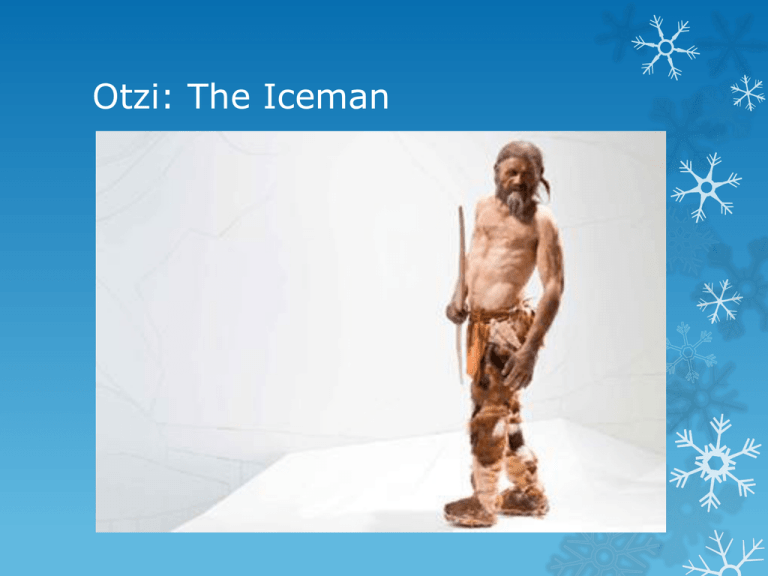
Otzi: The Iceman Review History is a detective story Historians and Archaeologists speculate- or make educated guesses about the past. They try to avoid making assumptions- or guesses that are not supported with facts or evidence. Inference Historians and Archaeologists try to make logical conclusions based on evidence. Using evidence, they try to figure out the storythis is called inference. Inference- using reasoning to draw a logical conclusion from factual knowledge and evidence. Examples John comes into the room with a wet jacket, wet hair, and holding an umbrella. You infer… Suzie sniffled and a coughed. She had a box of tissues she kept nearby to blow her nose. You infer… Task You will think like an archaeologist and analyze evidence found with Otzi, the Iceman, a 5,300 year old mummy found in the Italian Alps in 1991. Using this evidence, you will make inferences as to whom the Iceman was, and what might have happened to him. First, some background…. The red arrow shows where hikers found the Iceman's body in 1991, poking out of ice at an altitude of about 10,500 feet. Many artifacts were scattered around the body. The site, in the Italian part of the Ötztal Alps, gave rise his nickname: Ötzi This is a model of the Iceman site. Near his feet they found two chunks of birch fungus on leather straps, a stone bladed dagger, and shoes. Near the head was a pack containing a maple leaf. Also found were an ax with a copper blade, two arrows, and string. Otzi was found by German tourists, Helmut and Erika Simon, on September 19, 1991. The body was at first thought to be a modern female hiker, tumbled down the mountain after an accident. It was roughly recovered by the Austrian authorities and taken to Innsbruck, where its real age was finally discovered: 5,300 years old Italy and Austria fought over Otzi, but Italy proved their claim. He is now on display at the South Tyrol Museum of Archaeology. One piece of paper. All group members names on it. 1. What can you infer about the life and death of Otzi from the body? 2. Explain the reasons for your inferences. In the laboratory, researchers raised the temperature to 64°F to thaw him on a sheet of sterilized aluminum foil in a box custommade to accommodate his crossed feet and oddly outstretched left arm. The 30 ounces of meltwater collected during the overnight defrosting is being analyzed for cold-adapted bacteria: Probing and snipping for nine hours, scientists harvested dozens of biological clues about the life and death of the Iceman: Neurosurgeons retrieved bits of a blood clot, suggesting brain trauma around the time the Iceman died: Near the Iceman's knee, a cross-shaped tattoo still stands out on his leathery skin. It may have been a folk remedy for arthritic joint pain: Otzi had several tattoos on his body like these on his back. They were made by cutting the skin and rubbing charcoal into the cut. They may have been a form of acupuncture used to treat arthritis Step 1: Artifacts For each artifact your group will analyze the evidence: What do you notice about Otzi’s things? Make a list of details/evidence. Example: Otzi’s ax is made from wood and copper. Pure copper is very heavy. The blade is very small. Step 2-Inferences Put these inferences in order to create a story of who the Iceman was and what happened to him. Example: Otzi carried the ax as a tool to help him survive. The ax was too small to be a good weapon against big animals. It would also not make a good weapon because copper is heavy and would be hard to carry. Step 3-Make a Story Put these inferences in order to create a story of who the Iceman was and what happened to him. What is your group’s theory? Example: Otzi was man who liked to go on adventures. He carried everything he would need with him because he went on adventures alone. His ax could be used for many things like gathering food, cutting plants for shelter, and cutting in to ice. Otzi’s shoes had hay inside deerskin uppers with bearskin sole. Artist’s Reconstruction of Shoe Bearskin sole. Deerskin top. Rope inside. Hay between rope and deerskin. Copper Axe Fur Quiver- 14 arrows with two finished Pouch, or belt Two chunks of birch fungus on leather straps. A maple leaf. its chlorophyll content indicates the leaf was picked when green, most likely in late spring. Flint blade and sheath. A tangle of string, possibly bowstring. After undergoing a nine-hour autopsy, Otzi is returned to 21°F. Before putting Otzi back on display, he is coated him with a fine spray of sterilized water, which freezes on contact to protect him from contamination and dehydration. At 21°F and 98.5 percent humidity, the museum mimics the glacial environment that preserved him for more than five millennia Photo scan of Otzi http://iceman.eurac.edu/ The Iceman's shoes—hay for warmth inside deerskin uppers with bearskin sole—are among the oldest ever found: Artist’s Reconstruction of Shoe Bearskin sole. Deerskin top. Rope inside. Hay between rope and deerskin. Copper Axe Fur Quiver- 14 arrows with two finished Two arrows served for hunting and self-defense Pouch, or belt Belt held fire starting kit and first aid materials Two chunks of birch fungus on leather straps, possibly used to stop bleeding and prevent infection, were part of a portable first-aid kit. A maple leaf used to wrap embers; its chlorophyll content indicates the leaf was picked when green, most likely in late spring: The Iceman's dagger? Or Flint? Flint blade and sheath. A tangle of string, possibly bowstring. After undergoing a nine-hour autopsy, Otzi is returned to 21°F. Then he will be moved to the large glass slab on which he lies for public viewing Before putting Otzi back on display, pathologist Eduard Egarter Vigl coats him with a fine spray of sterilized water, which freezes on contact to form a glistening glaze that protects him from contamination and dehydration. At 21°F and 98.5 percent relative humidity, the museum mimics the glacial environment that preserved him for more than five millennia Photo scan of Otzi http://iceman.eurac.edu/
